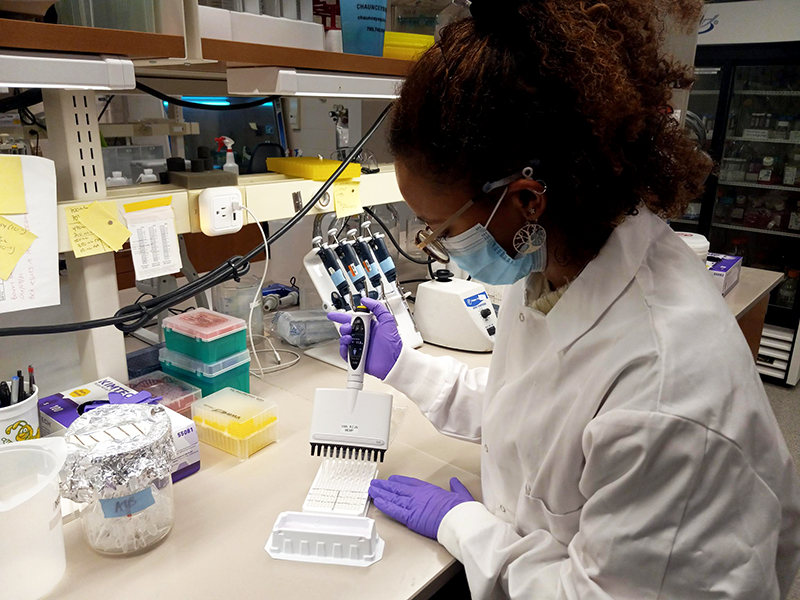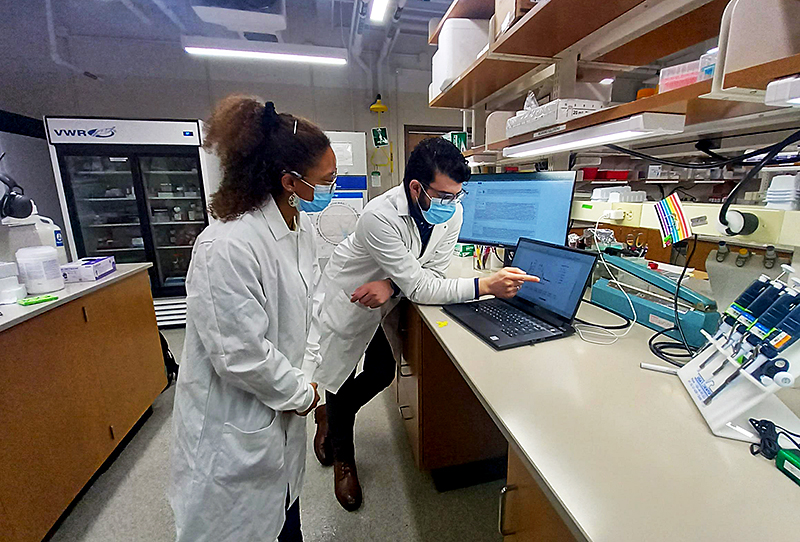March 3, 2022
New plant-based compounds have been created to treat alcohol use disorder

Arryn Blaine, a doctoral candidate in Purdue University’s College of Pharmacy, conducts research in Richard Van Rijn’s laboratory on compounds that may be able to treat alcohol use disorder. The compounds are based on alkaloids found in the kratom plant. (Purdue Research Foundation photo/Steve Martin)
WEST LAFAYETTE, Ind. – The 2019 National Survey on Drug Use and Health reported that 14.5 million people ages 12 and older have alcohol use disorder, or AUD. This represents 5.3% of that population, according to the National Institute on Alcohol Abuse and Alcoholism.
Researchers in Purdue University’s College of Pharmacy, the Purdue Institute for Drug Discovery and Washington University in St. Louis are synthesizing compounds to treat people affected by AUD. The research was published in the peer-reviewed journal Frontiers in Pharmacology.
Richard Van Rijn, adjunct associate professor of medicinal chemistry and molecular pharmacology in Purdue’s College of Pharmacy, leads the research program with Susruta Majumdar, associate professor of pharmaceutical and administrative sciences in the University of Health and Sciences & Pharmacy in St. Louis. Van Rijn said the compounds are based on alkaloids found in the plant Mitragyna speciosa, or kratom. These compounds could treat AUD and have less abuse potential than opium-derived opioids.
 Arryn Blaine (left) and Yazan Meqbil, doctoral candidates in Purdue University’s College of Pharmacy, confer in Richard Van Rijn’s laboratory about results from tests of compounds that may be able to treat alcohol use disorder. The compounds are based on alkaloids found in the kratom plant. (Purdue Research Foundation photo/Steve Martin)
Download image
Arryn Blaine (left) and Yazan Meqbil, doctoral candidates in Purdue University’s College of Pharmacy, confer in Richard Van Rijn’s laboratory about results from tests of compounds that may be able to treat alcohol use disorder. The compounds are based on alkaloids found in the kratom plant. (Purdue Research Foundation photo/Steve Martin)
Download image
“We can synthesize a derivative of the natural-occurring kratom alkaloid speciogynine, which has superior potency to reduce alcohol intake,” Van Rijn said. “We used mouse models of alcohol use and assessment of adverse effects, including monitoring for seizures or hyperactivity. Our synthesized compound does not display adverse effects observed with other kratom alkaloids, including abuse potential, hyperactivity and seizures. As such, this molecule may have utility in humans in treating alcohol use disorder.”
Alkaloids found within kratom, Van Rijn said, are considered less problematic than synthetic opioids or opium-derived opioids like fentanyl, morphine and oxycodeine.
“The U.S. Drug Enforcement Agency has not scheduled kratom as a substance of abuse,” he said. “More research is needed to properly establish this, but one hypothesis for their lower risk for abuse is related to their cellular pharmacology.”
Still, Van Rijn said, several steps are needed to further develop the compound to treat AUD.
“We will look to reduce any potential off-target effects. Kratom alkaloids may interact with multiple nonopioid receptors, so improving the current molecule series to limit those interactions would make the molecule safer,” Van Rijn said.
“We also need to conduct studies to determine the half life of the drug, how it is metabolized and how much is getting into the brain.”
A provisional patent application on the research was filed by the co-owner, University of Health Science & Pharmacy in St. Louis. Industry leaders looking to develop or license the compound should contact Annie Ghosh of the Purdue Research Foundation Office of Technology Commercialization at aghosh@prf.org about 2022-VANR-69644.
About Purdue Research Foundation Office of Technology Commercialization
The Purdue Research Foundation Office of Technology Commercialization operates one of the most comprehensive technology transfer programs among leading research universities in the U.S. Services provided by this office support the economic development initiatives of Purdue University and benefit the university's academic activities through commercializing, licensing and protecting Purdue intellectual property. The office is housed in the Convergence Center for Innovation and Collaboration in Discovery Park District at Purdue, adjacent to the Purdue campus. In fiscal year 2020, the office reported 148 deals finalized with 225 technologies signed, 408 disclosures received and 180 issued U.S. patents. The office is managed by the Purdue Research Foundation, which received the 2019 Innovation and Economic Prosperity Universities Award for Place from the Association of Public and Land-grant Universities. In 2020, IPWatchdog Institute ranked Purdue third nationally in startup creation and in the top 20 for patents. The Purdue Research Foundation is a private, nonprofit foundation created to advance the mission of Purdue University. Contact otcip@prf.org for more information.
Writer: Steve Martin, sgmartin@prf.org
Source: Richard van Rijn, rvanrijn@purdue.edu

